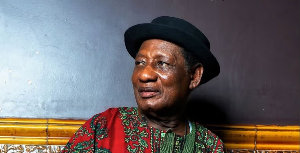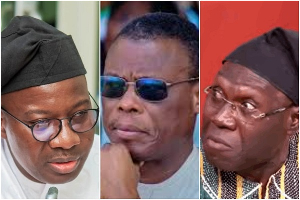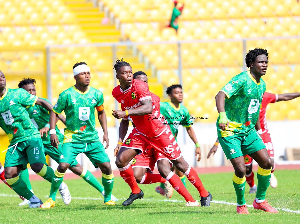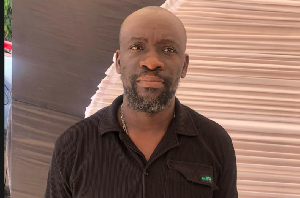On December 19, 2018, the President of the Republic of Ghana, His Excellency Nana Addo Danquah Akufo-Addo, met with a cross-section of the media at the seat of government. This was part of his ‘PRESIDENT MEETS THE PRESS’ series which was introduced by the New Patriotic Party led government during the era of His Excellency John Agyekum Kuffour. I believe the government should be applauded for continuing such a commendable exercise.
During the President’s interaction with the media, he mentioned that the Office of the Special Prosecutor is gearing up to deliver on its mandate. It cannot be ignored that the Office of the Special Prosecutor, if it lives up to its mandate, will prove very pivotal to Ghana's quest to nip corruption in the bud.
The 2017 Corruption Perception Index report by Transparency International, for instance, ranked Ghana 81st out of 180 countries on the World Corruption Index. To tackle the menace of corruption, the Akufo-Addo led government, thus, brought into being the Office of the Special Prosecutor.
To resource the office to enable it deliver on its mandate, The Budget Statement and Economic Policy of the Government of Ghana for the 2019 Financial Year which was presented to Parliament on Thursday, the 15th day of November 2018, by the Minister for Finance captured the Special Prosecutor’s Office. Item number 49 on Appendix 4A: MDA Expenditure Allocation – 2019, indicates that an amount of GH¢ 180,160,231 has been allocated to the Office of the Special Prosecutor.
Although this move by government, has given the Special Prosecutor's office some impetus, it goes without saying that this monetary allocation did not come without the very affable, vociferous, disciplined and outspoken Special Prosecutor – Martin A. B. K. Amidu resorting to numerous correspondence with the office of the President backed by a number of articles.
In an earlier article titled ‘The Special Prosecutor; a new god in town’ I mentioned that such a key institution can easily be frustrated in its fight against corruption. One means of doing so is for the Attorney-General to employ the power of 'nolle prosequi'. I do not need a special sticker from ‘Prophet One’ or ‘Angel Obinim’ to know that such an occurrence is possible.
Just as I feared, on the same day that the President addressed the Media, news broke on various news portals that the State, through the Attorney-General’s Department has entered a 'nolle prosequi' against Chinese galamsey queen known as Aisha Huang. What this meant was that, the State was no longer interested in prosecuting her and is not obliged to give any reason(s) for its decision. This points to the fact that my prediction in the earlier article mentioned supra is not far from materializing. I keep wondering what will happen when our Special Prosecutor commences prosecution of alleged corrupt persons only for the Attorney-General to step in with the almighty 'nolle prosequi'.
Ghana’s Special Prosecutor in his own article, “The Whitaker Scenario – Stifling Independent Investigative Agencies of Funds” conceded that his work can easily be frustrated. The Whitaker Scenario article revealed the various tactics and techniques that can be employed to disable his work; including but not limited to, budgetary starvation of his office, political interference, amongst others. If even the United States of America can render its Special Prosecutor toothless, then it goes without saying that Ghana’s Special Prosecutor may have been set to fail from its inception.
To prevent a situation where the Special Prosecutor’s work would be interfered with by the use of nolle prosequi, it is my humble opinion that Section 54 of the Criminal and Other Offences (Procedure) Act, 1960 (Act 30) should be amended. It should be amended to require the Attorney-General to state reasons whenever a nolle prosequi is entered. Also, such a nolle prosequi should be with the consent of the court.
Though the discharge of an accused consequent on the exercise of the power of nolle prosequi is equivalent to wiping the slate clean, as far as the discontinued proceedings are concerned, this is, of course, without prejudice to restarting fresh proceedings against the accused, on the same facts.
However, if an amendment is made in line with the suggestion supra, it would go a long way to provide the citizens of this country with an assurance that our resources would not be committed into fighting corruption, only for the ‘fight’ to be discontinued midway without reason – as happened in the Aisha Huang scenario. This recommendation should apply mutatis mutandis to a withdrawal entered by the Attorney-General (however, it is also recommended that the effect of a withdrawal should be the made the same as that of a nolle prosequi).
The Special Prosecutor has security of tenure. For this reason, there is no excuse for him to allow himself to be influenced by ‘outside pressure’ or ‘political influence’ which will prevent him from delivering on his mandate.
Let me conclude by borrowing Mr. Martin Amidu’s call on all to “join the citizen patriotic fight against corruption that has ravaged it since independence.”
GOD BLESS OUR HOMELAND GHANA AND MAKE OUR NATION GREAT AND STRONG!
Opinions of Saturday, 5 January 2019
Columnist: Peprah
Will the Special Prosecutor succeed?
Entertainment














